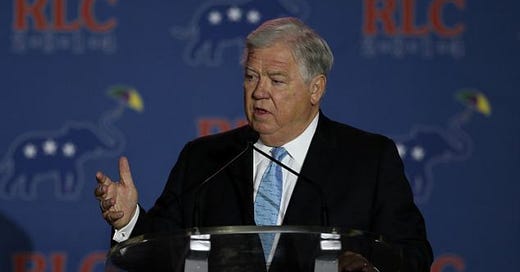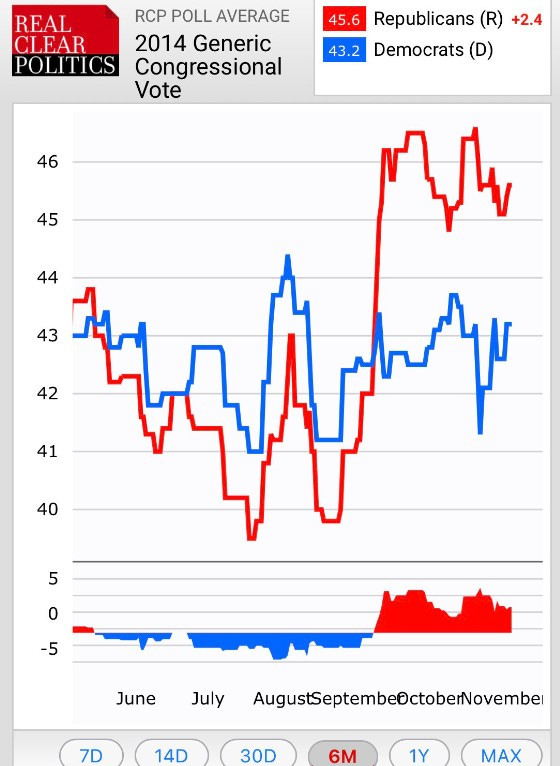The Democrats' Political "Hectic Flush"
Democrats claim August polling shifts and recent legislative "accomplishments" portend election wins this Fall. Welcome to the Democratic "hectic flush."
During the 1994 elections, I chaired an informal organization of senior GOP congressional aides. We met monthly to hear from various GOP newsmakers and insiders.
Before the historic 1994 “Contract with America” election, I invited the House and Senate GOP campaign committees' staff directors and Republican National Committee chair and future two-term Mississippi Governor Haley Barbour to update us on the upcoming elections.
All of us in the room, many with years of political campaign experience, knew that the 1994 election would be unique. The wind was at our backs with US House special election victories in two bellwether districts previously held by Democrats, Oklahoma’s Sixth District (won by Frank Lucas) and Kentucky’s Second District (won by Ron Lewis).
But control of the US House for the first time in 40 years? It seemed like a stretch. But Mario Cino, then-executive director of the National Republican Congressional Committee, expertly detailed how the GOP could gain over 50 seats. Having worked in several US Senate campaigns that year, I suggested the GOP was poised to win at least seven seats, winning back the control they’d lost eight years earlier. After all, I was behind a “Seven More in ‘94” theme advocated by the Senate GOP’s campaign chair, Senator Phil Gramm (R-TX). The Senate’s version of the House GOP’s “Contract with America.”
Then came Chairman Barbour to the podium. He noted that Democrats saw signs of life in their election prospects late that summer, not unlike what we see now in 2022. I don’t remember Barbour’s exact words, but I learned a new medical term.
In his legendary Mississippi drawl, I remember Barbour’s extolling this as a “hectic flush:” when someone rallies before they die. He rightly predicted that 1994 would be a historic GOP win.
In fairness, that’s not the actual definition of a hectic flush. But it made for quite an impression.

House Republicans that Fall won control with 54 seats, while Senate Republicans won eight seats with two more - Senators Richard Shelby (AL) and Ben Nighthorse Campbell (CO) switching parties to become Republicans. Democrats would win one seat back when Democrat Ron Wyden won an Oregon special election in a seat vacated by Republican Robert Packwood. Bob Dole was Senate Majority Leader again.
And history may be repeating itself (rhyming?) in 2022. Primary election turnout and various polling suggest that Republicans are poised for many victories this fall. And as in 1994, Democrats have clawed back some of their support in August polling, coupled with what some consider legislative accomplishments and a “vibe shift,” complete with goofy “dark Brandon” memes. Democrats really can’t meme.
Democrats are bragging about legislation badly misbranded as the “Inflation Reduction Act,” which raises taxes on companies and middle-class Americans, provides generous tax credits for expensive electric vehicles, and authorizes 87,000 new IRS agents. And it has nothing to do with inflation. More like the IRS Expansion Act. Victory, indeed, but for whom? If the “Inflation Reduction Act” were food, the FDA and USDA would demand a full product recall.
Democrats are also crowing about the CHIPS act, which throws taxpayer money at companies to produce memory chips here. It’s garnished with corporate handouts and bloated federal agency spending in an ode to Soviet-style “industrial policy.”
And those electric vehicle tax credits in the IRS Expansion Act? Practically no electric vehicles on sale today qualifies because they run on lithium-ion batteries sourced from China. And both Ford and General Motors raised their prices to correspond with the tax credit. Yeah, that’s a big Democratic “win.”
But recent August polling - notoriously unreliable and poor predictors of election trends and outcomes - has Democrats hopeful. GOP US Senate nominees in Arizona, Pennsylvania, Georgia, and Ohio in unreliable August polling trail their Democratic opponents. In some cases, by double digits.
That led Senate GOP Leader Mitch McConnell to lament this week that the GOP may not retake control of the Senate this fall, citing “candidate quality” and the unique aspects of statewide Senate elections. And it’s no secret that Democratic candidates are badly outraising Republicans. Never underestimate the ability of Republicans to seize defeat from the jaws of victory, goes an old lament among GOP political operatives. Some of the GOP nominees, especially in Pennsylvania, weren’t my first choice, either.
The respected Cook Political Report, which relies on increasingly unreliable polling and missed the mark in previous elections, has shifted some of its prognosis to favor Democratic candidates. Of course, that can move back. The same was true of the University of Virginia’s Center for Politics, led by Dr. Larry Sabato, who issued a “mea culpa” after many of his prognoses in 2016 proved wrong.
Polls aren’t always bad, of course, but they are snapshots in time and very poor predictors of election outcomes, especially in August. Political prognosticators like Cook and Sabato rely too heavily upon them. They should consider investing a little time and money visiting some of the districts and states they are “rating.” You know, time on the ground. Venturing outside Washington’s beltway can be interesting. Just ask Salena Zito. I used to do that as a political operative in the 1980s. You learn things polls just can’t measure or tell you.
This is your reminder that almost exactly one year ago, GOP gubernatorial candidate Glenn Youngkin trailed his opponent, former Democratic Governor Terry McAuliffe, by nine points. How did that election turn out? As for polling, here’s another reminder from that 1994 election below, using the generic ballot test (party preference).
Ron Johnson's successful campaign against Democrat Russ Feingold in 2016 surprised pollsters, who had him pegged to lose reelection. The weaponization of polling for political goals cannot be ruled out - see the final ABC/Washington Post poll of the 2020 election in Wisconsin, which showed Donald Trump losing to Joe Biden by 17 points.
Final margin? About .06 percent. Malevolence? It probably was if it looks and smells like a voter suppression poll. Oh, and guess what - some polls have Johnson behind again.
August is vacation and “back to school” month for many Americans, who are primarily not focused on politics. General election campaigns typically take off after Labor Day, with “swing voters” often not paying attention until the final three weeks. Early voting trends will be interesting.
This is also your reminder that primary election turnout results in many states portend a highly energized electorate that favors Republicans. Wyoming’s elections this week may not be the best indicator since its Democratic party is so tiny, but look no further than bellwether elections elsewhere, including Pennsylvania and Wisconsin.
This is also a reminder that the issues Americans focus on - sky-hi grocery and gasoline prices, rising crime rates, and an immigration crisis - will dominate voter’s concerns this fall. That’s baked in. And none of those issues play well for Democrats.
Democrats claiming credit for gas prices that have recently dropped won’t tell you why - high prices have dramatically driven down demand as many Americans can’t afford to fill up their cars and trucks. And wait until the heating bills start showing up. Meanwhile, the Federal Reserve Board will be ratcheting mortgage interest rates well into seven percent territory. Or higher.
Oh, sure, Democrats will try to use climate change and abortion to motivate their voters and will experience modest success in some purplish suburban enclaves. Gaff-prone candidates making stupid comments about rape in Missouri and Indiana cost the GOP two US Senate losses in 2014 that they should have won. But abortion and climate change won’t resonate with the everyday concerns of most Americans, who are also angry about dysfunctional government and lousy leadership in Washington. From an NBC Poll in July:
While 47% of adults say their current financial situation is stable, 42% say they are struggling. Just 10% say the country is on the right track (88% say its on the wrong track) and only 8% say the federal government has helped their most important concern over the last 6 months (57% say the government has hurt it, and 34% say the government has had no real impact on their top concern).
As pollster and messaging expert Frank Luntz noted, most Americans are driven by unaffordability, anxiety, and anger. Things can change, of course. But while it may not qualify as a hectic flush, most signs suggest that Democrats are whistling past the political graveyard.






